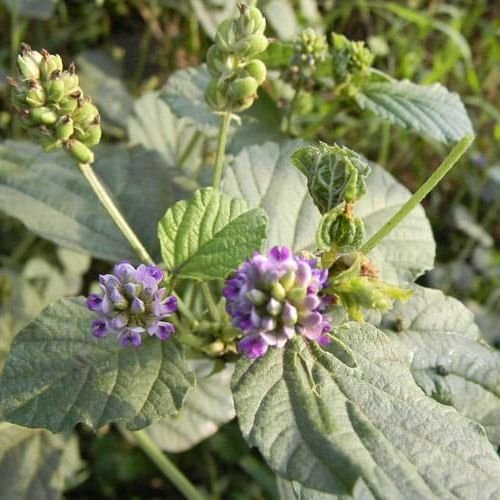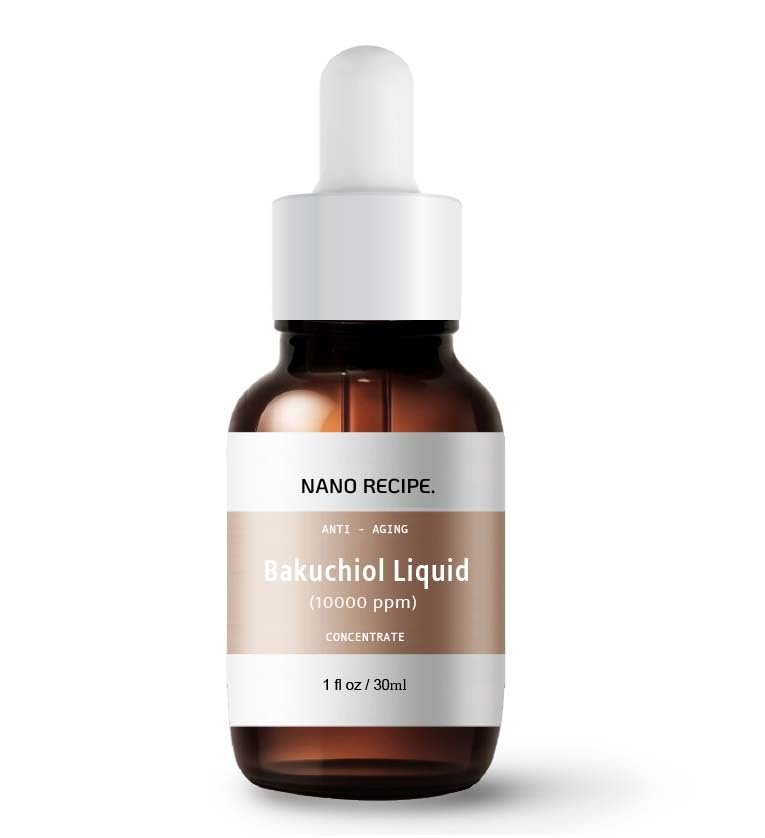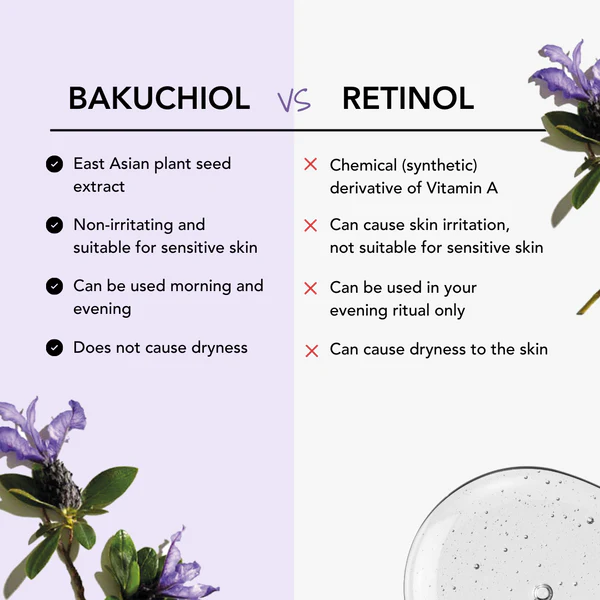Bakuchiol: Natural Anti-Aging Skincare – Proven Benefits & Potential Side Effects
Everything You Need to Know About This Plant-Based Retinol Alternative

About Bakuchiol | Anti-Aging Properties | Anti-Inflammatory | Acne Reduction | Prevents skin photoaging | Improves Sensitive Skin | Boosts Collagen | Bakuchiol Vs Retinol | Side Effects | Bakuchiol-rich Foods | Conclusion
More people are turning to natural skincare ingredients for anti-aging, and bakuchiol is gaining attention as a gentle, plant-based alternative to retinol.
One major challenge folks face is finding a product that combats signs of aging like wrinkles and fine lines without causing irritation or sensitivity. That’s where bakuchiol comes in. Extracted from the Psoralea corylifolia plant, this natural compound promises the benefits of retinol without the potential side effects.
In this article, we’ll dive into everything you need to know about bakuchiol. From bakuchiol skincare benefits and potential drawbacks to the proper way to include it in your skincare routine, our goal is to equip you with all the necessary information so you can decide if bakuchiol is the right choice for your skin.
What is Bakuchiol?
Bakuchiol is a natural compound that comes from the seeds and leaves of a plant called Psoralea corylifolia, which is often found in Asia.

Bakuchiol is gaining popularity in skincare products because it is believed to have similar benefits to retinol, a well-known ingredient used to reduce wrinkles and improve skin texture. However, bakuchiol is gentler on the skin, making it a good choice for people with sensitive skin. [1]
For example, a 2019 study published in the British Journal of Dermatology concluded that bakuchiol is as effective as retinol for reducing wrinkles and hyperpigmentation, but with fewer side effects. In the study, 44 volunteers used bakuchiol or retinol for 12 weeks, and bakuchiol users reported less skin irritation.
Bakuchiol works by encouraging the skin to produce more collagen – a protein that keeps our skin firm and youthful – according to expert dermatologist Dr. Davin Lim. [2]
When we are young, our skin makes a lot of collagen, but as we age, it makes less. Collagen production in the body begins to decline naturally around the age of 25.
This gradual decrease continues as we age, leading to common signs of aging such as wrinkles, sagging skin, and reduced skin elasticity. Using bakuchiol can help boost collagen levels. [3]
Bakuchiol reduces fine lines, improves skin elasticity, and helps with uneven skin tone. It can also assist with acne and boasts anti-inflammatory properties, making it effective for calming irritated skin.
Bakuchiol can be found in various skincare products like serums, creams, and oils. To use it, you typically apply it to clean skin, just like you would with any other skincare product.
Benefits of Bakuchiol for Skin

1. Anti-Aging Properties
Using bakuchiol can really help your skin look younger. It can reduce the appearance of fine lines and wrinkles by helping your skin produce more collagen, which keeps your skin tight and firm.
In a 2019 study published in the British Journal of Dermatology, it was found that bakuchiol and retinol both effectively reduce wrinkle surface area and hyperpigmentation. However, retinol users experienced more skin scaling and stinging. This highlights bakuchiol’s advantage for those with sensitive skin.
Bakuchiol even protects your skin from environmental damage, helping to prevent premature aging. This makes it a strong ally in any anti-aging skincare routine. A study in 2018 also published in the British Journal of Dermatology noted that both topical bakuchiol and retinol show potential in improving signs of aging caused by sun exposure, though more in vivo studies are needed to compare their long-term efficacy and side effects.
Additionally, a 2022 study in the Journal of Cosmetic Dermatology highlighted bakuchiol’s promising anti-aging, anti-inflammatory, and antibacterial properties. This makes it a strong alternative to retinol-based skincare products, offering multiple benefits without the rough side effects.
2. Anti-Inflammatory and Antioxidant Effects
Bakuchiol shows strong anti-inflammatory and antioxidant properties, which help reduce skin inflammation and protect skin against oxidative stress.
A 2022 study published in the Journal of Drugs in Dermatology noted that bakuchiol shows potential as an alternative treatment for various skin conditions, including psoriasis and even skin cancers.
It regulates inflammatory pathways, reducing cytokine production and promoting skin healing, as highlighted in a 2023 systematic review.
Additionally, bakuchiol acts as a potent antioxidant, scavenging free radicals to protect skin cells from oxidative stress and photoaging, as mentioned in this 2024 comprehensive review of the skin use of bakuchiol.
3. Reduces Acne
A lot of people mightn’t know this, but bakuchiol is really good for helping with acne, too.
Bakuchiol has strong anti-inflammatory properties that help with skin conditions like acne and dermatitis. A review from January 2024 found that bakuchiol’s antimicrobial properties can target multiple aspects of acne.
Research from 2011 by Chaudhuri and Marchio showed that bakuchiol can boost the effectiveness of acne treatments while being gentle and easy to use.
Bakuchiol also shows promise in improving psoriasis and reducing skin cancer cell growth, making it a versatile option for skincare.
4. Prevents skin photoaging
Bakuchiol can also help prevent skin photoaging by protecting against damage from UVA rays. It reduces inflammation markers like IL-8 and prevents the loss of important skin components called glycosaminoglycans.
A study by Bacqueville et al. in 2020 found that a combination of bakuchiol and vanilla tahitensis extract effectively prevents photoaging and improves the appearance of naturally aged skin in women.
By using bakuchiol, you can protect your skin from sun damage and keep it looking youthful and healthy, all while avoiding the harsh side effects of synthetic products.
5. Improves Sensitive Skin
For those of you with sensitive skin, bakuchiol is a great option. It’s well-tolerated even by people with conditions like eczema, rosacea, and cosmetic intolerance syndrome. Bakuchiol helps improve skin smoothness, clarity, radiance, and overall appearance without causing irritation.
A study published in the Journal of Drugs in Dermatology in 2020 tested a bakuchiol-containing cleanser and moisturizer on 60 women aged 40-65 with sensitive skin.
The results were impressive: participants saw improvements in skin smoothness and moisture, with a significant 16% increase in skin moisture content. This research confirms that bakuchiol is both effective and gentle for sensitive skin.
6. Boosts Collagen Production
For those wanting to boost collagen, bakuchiol can help. Collagen keeps your skin firm and smooth. Bakuchiol derivatives, like bakuchiol salicylate (Bakusylan), improve how well the skin absorbs the product and increase type IV collagen, which is important for strong, firm skin.
A 2022 study by Quijas et al. found that Bakusylan helps make more collagen by working with the skin’s natural processes. This makes bakuchiol a great ingredient for keeping your skin firm and youthful.
How Bakuchiol Compares To Retinol?

Bakuchiol, a plant-derived compound, has gained attention as a potential alternative to retinol for anti-aging skincare. Both compounds are known for their ability to improve skin appearance, but they differ in their side effects and mechanisms of action.
Here’s a quick summary of how Bakuchiol compares to Retinol:
| Aspect | Bakuchiol | Retinol |
|---|---|---|
| Efficacy in Reducing Wrinkles and Hyperpigmentation [4] | Both bakuchiol and retinol significantly decrease wrinkle surface area and hyperpigmentation, with no statistical difference in their effectiveness. | Both bakuchiol and retinol significantly decrease wrinkle surface area and hyperpigmentation, with no statistical difference in their effectiveness. |
| Side Effects [5] [6] | Minimal side effects, making it suitable for sensitive skin. | Reports of more adverse effects such as skin scaling, stinging, and redness. |
| Mechanism of Action [7] [8] | Induces similar gene expression changes in the skin, acting as a functional analogue of retinol despite structural differences. | Induces similar gene expression changes in the skin. |
| Anti-inflammatory and Antioxidant Properties [9] | Notable anti-inflammatory and antioxidant properties, contributing to its anti-aging effects and making it suitable for sensitive skin. | Lacks the additional anti-inflammatory properties that make bakuchiol extra beneficial for sensitive skin. |
| Holistic Treatment Approach [10] | Addresses multiple aspects of skin aging, including reducing reactive oxygen species and inflammation, supporting its use as a comprehensive anti-aging treatment. | Focuses primarily on reducing wrinkles and hyperpigmentation, without the additional holistic benefits. |
In conclusion, both bakuchiol and retinol are effective at reducing signs of aging like wrinkles and dark spots. However, bakuchiol offers significant advantages with fewer side effects and added benefits for sensitive skin, making it a natural and gentle alternative to retinol.
Potential Side Effects and Who Should Avoid It
Although bakuchiol is well-tolerated by many, some people may experience side effects, especially those with pre-existing skin conditions like contact dermatitis.
A 2020 case study highlighted a patient with facial eczema who had an allergic reaction to bakuchiol.
Similarly, in 2019, a 33-year-old woman with an one-year history of erythematous and itchy plaques on the both eyelids, perioral area, and neck, as she told her dermatologist that she used only “hypoallergenic cosmetic products for sensitive skin” – which included bakuchiol. [11]
Additionally, some studies suggest bakuchiol could cause liver and kidney issues in rats. [12] [13]
Therefore, individuals with known allergies or sensitive skin should be cautious when using bakuchiol.
It’s a good idea to test it on a small part of your skin before putting it all over your face and to start with products that don’t have a lot of bakuchiol if you’re new to it.
If you see any bad reactions, think about using it less often or talk to a skin doctor.
Bakuchiol-rich Foods
If you are looking to get bakuchiol from food, I’ve got bad news: there are no specific foods that are rich in bakuchiol. Instead, this compound is mainly obtained from extracts of the babchi plant.
- Primary Source: The babchi plant, known scientifically as Psoralea corylifolia, is the main source of bakuchiol. This plant is commonly found in India and parts of Asia and has been used for centuries in Ayurvedic and Traditional Chinese medicine for its healing properties.
- Other Sources: Bakuchiol can also be found in small amounts in other plants like Piper longum and Ulmus davidiana, but the babchi plant remains the most significant source. [14]
Conclusion
In conclusion, bakuchiol, a plant-based alternative to retinol, offers you a myriad of health benefits, including anti-aging and improved skin health, without the harsh side effects commonly associated with retinol.
Though it’s found in certain foods, understanding its bioavailability and the factors that influence it are crucial. If you’re not getting enough through diet, you might notice deficiency symptoms.
Always consider recommended daily intake and consult a professional to ensure it fits your health regimen effectively and safely.
Skin Related Posts
